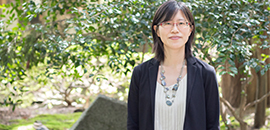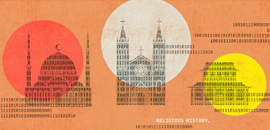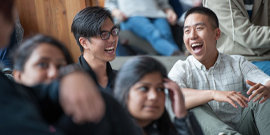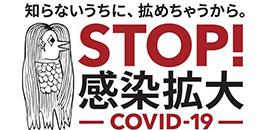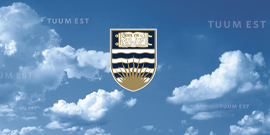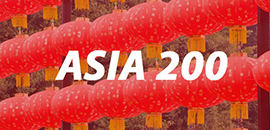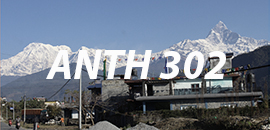
June 01, 2020 The Update is a regular roundup of news in the Department of Asian Studies for our Students, Faculty and Staff |
|
|||||||||||||
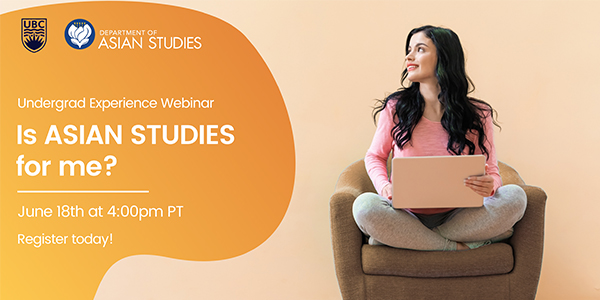 |
|||||||||||||
Webinar: Is Asian Studies For Me? Planning to take Asian Studies courses? Interested in Asian Studies but not sure if you should major in it? The Department of Asian Studies is excited to invite you to our first undergrad experience webinar! Course planning and trying to decide on a major or minor, whilst also coping with the current pandemic is not easy, so we’ve invited senior Asian Studies students and alumni with diverse experiences to connect with and inspire current students. Taking place on Thursday, June 18th at 4pm PST, the webinar will feature a Q&A session where students can ask questions about majoring in Asian Studies, Go Global experiences in Asian countries, and more! |
|||||||||||||
|
|||||||||||||
|
|||||||||||||
| Q&A With Dr. Qian Wang |
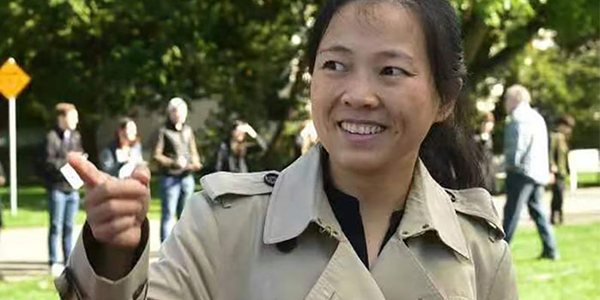 |
A Safe Space for Heritage and Non-Heritage Mandarin Speakers Did you know that Mandarin Chinese has four distinct spoken tones? As part of Asian Heritage Month, UBC's Language Sciences program interviewed Qian Wang of our Chinese Studies Faculty on creating a safe space for both heritage and non-heritage learners to share similar stories and challenges. |
| FEATURED SUMMER COURSES | ||||||
|
||||||
| STUDENT SPOTLIGHT: Sophie Rock |
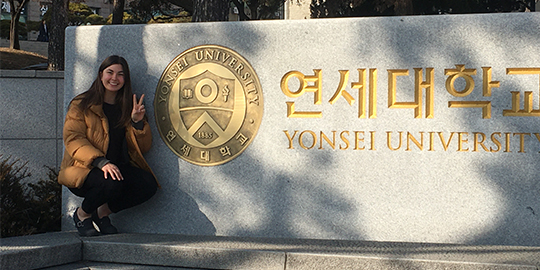 |
Sophie Rock is a 3rd year UBC International Relations student minoring in Korean Language and Culture. Currently, she is on a full-year exchange at Yonsei University in Seoul, South Korea. How has living in Korea met with your expectations of life there? In what ways has it exceeded it? Anything you didn’t expect or have been particularly challenged by? (Good or bad!) I made a really concentrated effort to come to Korea with absolutely no expectations - I didn’t want to be discouraged if it didn’t live up to some fantasy I had dreamt in my head. I think many students make the mistake of putting too much pressure on their exchange country to be perfect, and often get let down when they arrive. I also had the luxury of visiting Korea purely for vacation purposes several years ago - and through that experience, I was able to travel around, get a taste of the tourist life, and check most sightseeing boxes. Luckily, this allowed me to move to Korea with a fully “student” mind - that is, with the intention of really living and studying in Korea, rather than having to constantly check a to-do list of sights to see and things to do. Though I prepared myself for the “busy” lifestyle I was warned of, nothing quite acclimates you to a country than to be thrown right into it. Life here is so much busier and faster-paced than what I am used to in Vancouver. While that inevitably comes with a little more stress and pressure, it also means that there is always something to do. From 6 am sunrise hikes to 2 am chicken delivery, it’s hard to be bored in this city. Aside from adapting to the new pace of life, pushing outside of the foreigner bubble was also far more difficult than I had expected it to be. I had prepared myself for a month of exclusively foreigner-only hangouts and a lot of English speaking. But that month quickly extended into two and started to grow into a third. If you’re looking to avoid the foreigner bubble, you’ll need to prepare to push yourself often. Of course, it is scary and uncomfortable. But it is all part of the exchange experience! You’re living in this new country, so why not try out your language skills? You’ll inevitably make mistakes, but also, you’ll undoubtedly grow. Likewise, what has been a highlight of your travels there so far? For me, spending time with the friends I’ve made here consistently tops the list for best experiences. We don’t have to be doing anything special - but enjoying their company is always such a lovely time. Domestic students might think it’s funny, but having them show me their favorite cafes, parks, and neighborhoods is so special. As a foreigner, it’s difficult to avoid the most common and popular places. So having a local student suggest a place to visit has always yielded great experiences. Recently, I met a friend for dinner, and she suggested we bike along the Han River to our restaurant of choice. She knew the way effortlessly and guided me along a busy bike path during sunset. It is such a great memory, the views of Seoul all around me - along with some angry bikers who were not impressed with my relaxed speed. Notably, it is undeniably difficult to make local friends while abroad. Many of my professors asked me how I was getting along and if I had made any domestic friends - mentioning that it is often a difficult barrier to break through. My suggestion is to find a space you enjoy being in and occupy it frequently. With enough consistency and a little courage on your part, you’re bound to find a genuine friend or two. Notably, it took me almost four months to solidify the friendships I have now, but I am so grateful for all the experiences those friends have given me! |
| NEW SERIES: Inspiration in Isolation |
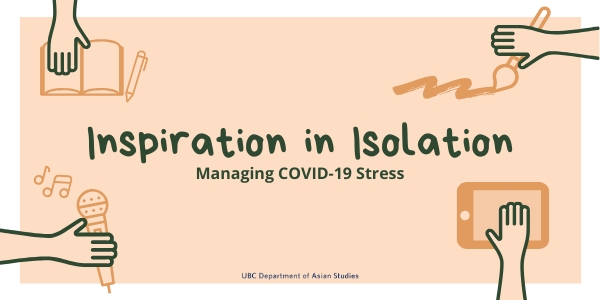 |
In this new series, Asian Studies faculty, staff, students and alumni are sharing their challenges and experiences in the transition to working online and teaching from home. We're adding new stories all the time! Click the link below to find out the new skills, old habits, technological challenges and words of ancient wisdom that they've come to live by. If you would like to take part, please email sophie.gardner@ubc.ca |
| ASIAN LIBRARY NEWS |
 |
Did you know that UBC Library can assist with all aspects of research data management? UBC Library provides valuable information and resources related to research data management. If you are producing, reusing, or interested in preserving and sharing your research data, visit: researchdata.library.ubc.ca |
| OPPORTUNITIES |
 |
The Society of Fellows (Princeton University): Fellowship Applications Open The Society of Fellows at Princeton University, an interdisciplinary group of scholars in the humanities and social sciences, calls for fellowship applications annually. For the 2021-2024 competition, three fellowships will be awarded: Open Discipline (2) and Humanistic Studies (1). Graduate students are encouraged to apply: both those now finishing their Ph.D., and those who received their degree after January 1, 2019. Also especially welcome are candidates from underrepresented backgrounds. The application deadline is August 4, 2020; letters of recommendation may be submitted until August 11. Please find a link to the printable call for applications here, and more information here. Critical Asian Studies: Call for Submissions Critical Asian Studies, a Taylor and Francis multidisciplinary academic journal, is soliciting 500-1,500-word online blog posts to for a linguistically and culturally diverse readership. With a focus on practice more than theory, the blog is now publishing posts emphasizing empirical evidence from early career scholars about emerging scholarship and research on new and critical topics infolding across Asia on the themes of research and opinion on politics, economic realities, or another critical topic in an Asian region, or reflections on fieldwork highlighting methods employed across various disciplines for research, analysis, and data collection. Deadlines for submission are on the last Friday of each month. If you would like to submit or propose a post, respond to webeditor.criticalasianstudies@gmail.com with your interest and potential topic. Canadian Journal of Undergraduate Research (CJUR): Call for Submissions CJUR is a multidisciplinary student-led publication that aims to provide an accessible platform for undergraduates from all Universities across Canada to gain experience in academic publishing, and was founded in 2015 at the University of British Columbia. Submissions are peer-reviewed by graduate students with experience in the field of the submission. CJUR is a great way to build your CV and have something to show for all your hard work! We accept manuscripts on a rolling basis, but the sooner you submit, the sooner you will hear back from us. For information on submission guidelines, please visit the CJUR website or email cjur.uro@gmail.com. UBC Community Development - Community of Caring Grants The Community of Caring grant offers up to $500 to support small community building projects that foster social connectedness during this time of physical distancing. Project ideas can involve sharing a skill or a resource, and must be carried out in compliance with the public health requirements of physical distancing. Application is open to faculty, staff, students, neighbourhood residents at UBC, and members of the Musqueam community. The deadline to apply is July 1, 2020, or when funding has been fully subscribed. To apply and for full details click here. |
| ON & OFF-CAMPUS EVENTS |
 |
UBC Workshop: Horticulture Training Program Session June 2 | 7:30pm - 8:00pm UBC Workshop: Equitable Decision-Making During COVID-19 June 4 | 2:00pm - 3:00pm June 17 | 12:00pm - 1:00pm #MOA From Home: Stay Connected Online Ongoing UBC Botanical Garden Centre Now Open Through Appointment Ongoing UBC Botanical Garden 360/3D Greenheart TreeWalk Ongoing Ongoing |
| ||||
|
This email is intended for asian.studies@arts.ubc.ca.
Unsubscribe |
